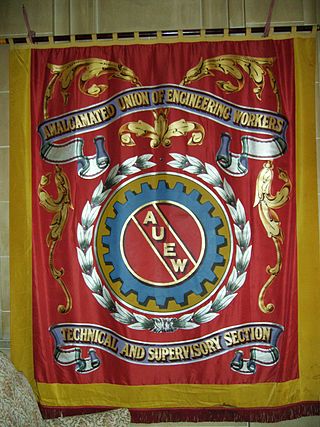Related Research Articles
In British politics, an affiliated trade union is one that is linked to the Labour Party. The party was created by the trade unions and socialist societies in 1900 as the Labour Representation Committee and the unions have retained close institutional links with it.

The Transport and General Workers' Union was one of the largest general trade unions in the United Kingdom and Ireland – where it was known as the Amalgamated Transport and General Workers' Union (ATGWU) to differentiate itself from the Irish Transport and General Workers' Union – with 900,000 members. It was founded in 1922 and Ernest Bevin served as its first general secretary.

The Technical, Administrative and Supervisory Section (TASS) was a British trade union.
The Australian Workers' Union (AWU) is one of Australia's largest and oldest trade unions. It traces its origins to unions founded in the pastoral and mining industries in the late 1880s and it currently has approximately 80,000 members. It has exercised an outsized influence on the Australian Trade Union movement and on the Australian Labor Party throughout its history.

The Iron and Steel Trades Confederation (ISTC) was a British trade union for metal-workers and allied groups, being the largest union in these fields. It was formed on 1 January 1917 as a merger of existing steel-workers' unions and it is now part of Community.
Community is a British trade union which formed in 2004. The union represents workers in a diverse range of sectors, including iron and steel, justice and custodial, domestic appliance manufacturing, textiles and footwear, road transport, betting, the third sector, education and early years as well as the self-employed.

The Modern Records Centre (MRC) is the specialist archive service of the University of Warwick in Coventry, England, located adjacent to the Central Campus Library. It was established in October 1973 and holds the world's largest archive collection on British industrial relations, as well as archives relating to many other aspects of British social, political and economic history.

The General Federation of Trade Unions (GFTU) is a national trade union centre in the United Kingdom. It has 35 affiliates with a membership of just over 214,000 and describes itself as the "federation for specialist unions".

The Amalgamated Engineering Union (AEU) was a major British trade union. It merged with the Electrical, Electronic, Telecommunications and Plumbing Union to form the Amalgamated Engineering and Electrical Union in 1992.

The Electrical, Electronic, Telecommunications and Plumbing Union, known as the EETPU, was a British trade union formed in 1968 as a union for electricians and plumbers, which went through three mergers from 1992 to now be part of Unite the Union.

The Irish Trades Union Congress (ITUC) was a union federation covering the island of Ireland.

The Confederation of Shipbuilding and Engineering Unions (CSEU), often known as the Confed is a trade union confederation in the United Kingdom.
The Federated Moulders' (Metals) Union of Australia (FMMUA) was an Australian trade union which existed between 1899 and 1983. It represented moulders – skilled tradesmen who fabricated the moulds for casting metal products in foundries. In spite of only organising within a single skilled occupation, which kept total membership low, the vital position of moulders in major industries such as mining, manufacturing and the railways, ensured that the union remained industrially powerful with a reputation for being highly militant.
The Amalgamated Union of Foundry Workers (AUFW) was a trade union representing workers in foundries in the United Kingdom.
The National Union of Domestic Appliances and General Operatives (NUDAGO) was a trade union representing metal workers in the United Kingdom, principally in the town of Rotherham. It primarily represented workers employed in manufacturing whitegoods, but also had some membership in foundries and light engineering.
The General Council of the Trades Union Congress is an elected body which is responsible for carrying out the policies agreed at the annual British Trade Union Congresses (TUC).
The National Federation of Building Trades Operatives (NFBTO) was a trade union federation in the United Kingdom, consisting of unions with members in construction and related industries.
The General Union of Tinplate Workers was a trade union representing sheet metal workers in the United Kingdom.
Archibald G. Logan was a Scottish trade unionist and politician.
References
- 1 2 3 Marsh, Arthur (1984). Trade Union Handbook (3 ed.). Aldershot: Gower. p. 113. ISBN 0566024268.
- ↑ Fyrth, H. J.; Collins, Henry (1959). The Foundry Workers: a trade union history. Amalgamated Union of Foundry Workers. pp. 321–322.
- ↑ Report on collective agreements between employers and workpeople in Great Britain and Northern Ireland. Vol. 1. London: Ministry of Labour. 1934. p. 300.
- ↑ Industrial Relations in Britain: An Industrial Relations Services Guide. Eclipse Publications Limited. 1988. p. 156.